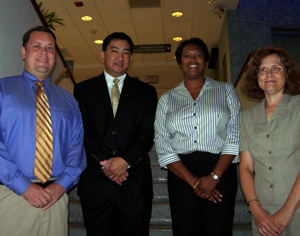 |
The second cohort of scholars in the UNMC Clinical and Translational Research Mentored Scholars Program are, from left, Chris Shaffer, Pharm.D., Alvin Wee, D.D.S., Pamela Jones, Ph.D., and Polly Hulme, Ph.D. |
The investigators, who come from various specialties around the UNMC campus, will take part in the post graduate level training designed to make medical center scientists competent in translating their research from the laboratory to the clinic or from the clinic to the community using multi-disciplinary approaches.
According to Prasad Padala, M.D., assistant professor of psychiatry and one of six members of the track’s first cohort, the program will quickly prove valuable to the new scholars.
“This track really has taught me a lot in terms of being a researcher,” Dr. Padala said, noting that he didn’t know how to effectively write grant proposals before he started his training. “I’m a better writer now.”
This is evidenced by the fact that Dr. Padala secured two pilot grants during his first year in the track.
The training track was introduced as part of UNMC’s increased emphasis on education and training in clinical and translational research.
“We aim for you to be independent clinical investigators when you finish this training,” said Fausto Loberiza Jr., M.D., an associate professor in the College of Medicine and program director.
|
|
The participants in the track’s second cohort are:
- Pamela Jones, Ph.D., assistant professor of community-based health in the College of Nursing;
- Polly Hulme, Ph.D., associate professor of community-based health in the College of Nursing;
- Alvin Wee, D.D.S., associate professor of otolaryngology; and
- Chris Shaffer, Pharm.D., adjunct associate professor of pharmacy practice.
The track is at least a two-year program of course work and includes an intensive mentored research project. The training program is patterned after existing programs at major U.S. medical centers.
The training process will expose scholars to the concepts and methods that emphasize multidisciplinary approaches to clinical and translational research.
The training also emphasizes the value of working with excellent mentors from UNMC and beyond.
During the orientation, the cohort met with Lani Zimmerman, Ph.D., professor in the College of Nursing and CCTR program director for education; Ted Mikuls, M.D., associate professor of rheumatology; and Helen McIlvain, Ph.D., professor in the College of Medicine; who all will advise members of the cohort.
Dr. Mikuls urged the new scholars to form strong, formal relationships with their mentors.
“It will be up to you as the mentee to make these relationships work and the best mentor-mentee relationships are very formal,” Dr. Mikuls said. “This means you regularly set aside time to discuss the status of your research with your mentor.”
Mentees would be well served to be aggressive in forming such relationships, he said.
“The best mentees I’ve had were incredibly persistent in maintaining our relationship, sometimes even annoyingly so,” Dr. Mikuls said. “But that’s what you have to do.”